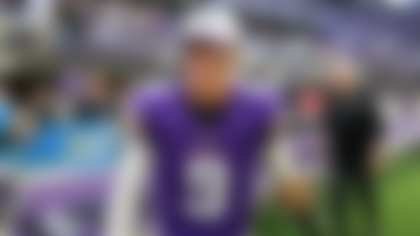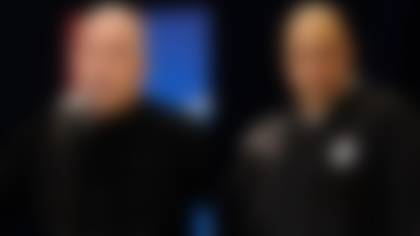The 2020 NFL Draft offers yet another pool of potential franchise quarterbacks. Before we welcome those prospects into the club, let's take stock of where we stand today. Marc Sessler has updated his rankings of each QB draft class since the turn of the millennium. Last offseason's rankings have been altered to reflect a scenery-shifting 2019 campaign.
NOTE: Pro Bowlers are denoted by bold/italics.
20) 2007
Round 1: JaMarcus Russell (No. 1 overall), Brady Quinn (No. 22)
Round 2: Kevin Kolb (No. 36), John Beck (No. 40), Drew Stanton (No. 43)
Round 3: Trent Edwards (No. 92)
Round 4: Isaiah Stanback (No. 103)
Round 5: Jeff Rowe (No. 151), Troy Smith (No. 174)
Round 6: Jordan Palmer (No. 205)
Round 7: Tyler Thigpen (No. 217)
Notable undrafted: Matt Moore
We begin our journey in grim territory. The 2007 NFL Draft was "headlined" by JaMarcus Russell, arguably the most severe quarterback bust of all time and a first-overall whiff who set the Raiders back years. The 6-foot-6, 265-pound LSU star produced a grotesque 7-18 mark as a starter and finished 2009 -- his final year in the league -- as the worst passer in football. Russell netted $39.4 million, while the Raiders, in return, were handed a raging headache. Same goes for the Browns, who reached for Brady Quinn at No. 22, only to turn around three years later and trade him to the Broncos for fullback Peyton Hillis -- who at least managed to sneak onto the cover of Madden. Longtime backup Drew Stanton is one of the few to earn points inside a flatlining class that handed us John Beck, Trent Edwards and the overhyped Kevin Kolb. High-level busts and zero reliable starters make this the worst crop of them all.
19) 2013
Round 1: EJ Manuel (No. 16)
Round 2: Geno Smith (No. 39)
Round 3: Mike Glennon (No. 73)
Round 4: Matt Barkley (No. 98), Ryan Nassib (No. 110), Tyler Wilson (No. 112), Landry Jones (No. 115)
Round 7: Brad Sorensen (No. 221), Zac Dysert (No. 234), B.J. Daniels (No. 237), Sean Renfree (No. 249)
Notable undrafted: Matt McGloin
Teams were surprised when the Bills reached for EJ Manuel with the 16th overall selection. Seen by most as a project with potential, the Florida State product was a turnover-prone flop in Buffalo -- a player Doug Marrone replaced with Kyle Orton before Rex Ryan signed Tyrod Taylor to avoid leaning on Manuel. This class lacked a true first-round prospect, while the only second-rounder, Geno Smith, is a starter-turned-backup best known for catching a fist to the jaw from his own teammate when not touting fringy "flat Earth" theories. Joining Manuel and Smith in the ranks of backup journeymen is lanky/erratic free agent Mike Glennon. Matt Barkley has thrown 76 passes since 2017, but remains active for now as a Bills reserve.
18) 2002
Round 1: David Carr (No. 1), Joey Harrington (No. 3), Patrick Ramsey (No. 32)
Round 3: Josh McCown (No. 81)
Round 4: David Garrard (No. 108), Rohan Davey (No. 117)
Round 5: Randy Fasani (No. 137), Kurt Kittner (No. 158), Brandon Doman (No. 163), Craig Nall (No. 164)
Round 6: J.T. O'Sullivan (No. 186), Steve Bellisari (No. 205)
Round 7: Seth Burford (No. 216), Jeff Kelly (No. 232), Ronald Curry (No. 235), Wes Pate (No. 236)
Notable undrafted: Shaun Hill, Chad Hutchinson
Best in show? I side with Josh McCown, last seen replacing an injured Carson Wentz in Philly's tight postseason loss to Seattle. Playing to type, the 40-year-old McCown refused to exit January's tilt despite tearing his hamstring off the bone mid-contest. While David Carr never lived up to the status of being the No. 1 overall pick, his situation reminds me of what happened to Tim Couch in Cleveland: a young quarterback tossed into the fire on a wanting expansion team struggling to find its way. David Garrard produced a flock of flashy moments with the Jaguars, while Shaun Hill -- an undrafted arm -- spent 15 years in the league. This class was also yanked to Earth by two first-round nightmares, Detroit's Joey Harrington and Washington's Patrick Ramsey, who combined for a 28-51 record with the teams that mistakenly chose them. For diehards, this class also gifted us with undrafted mystery Chad Hutchinson.
17) 2010
Round 1: Sam Bradford (No. 1), Tim Tebow (No. 25)
Round 2: Jimmy Clausen (No. 48)
Round 3: Colt McCoy (No. 85)
Round 4: Mike Kafka (No. 122)
Round 5: John Skelton (No. 155), Jonathan Crompton (No. 168)
Round 6: Rusty Smith (No. 176), Dan LeFevour (No. 181), Joe Webb (No. 199), Tony Pike (No. 204)
Round 7: Levi Brown (No. 209), Sean Canfield (No. 239), Zac Robinson (No. 250)
You could argue that Sam Bradford was a major factor in the previous collective bargaining agreement rolling out a much-needed rookie pay scale. Bradford's six-year, $78 million rookie contract came packed with an outrageous $50 million in guarantees. As an unconvincing Offensive Rookie of the Year winner, the snakebitten signal-caller missed 25 games over his final two seasons in St. Louis due to a string of disastrous injuries.
Bradford's career might be over due to long-term knee issues, but he sits atop a class sprinkled with career backups -- Colt McCoy and out-of-the-league Jimmy Clausen -- and one memorable first-round reach in Tim Tebow, who operated as a worldwide sensation during a magical run with the Broncos in 2011 before flaming out entirely and winding up as a minor leaguer with the Mets.
16) 2009
Round 1: Matthew Stafford (No. 1), Mark Sanchez (No. 5), Josh Freeman (No. 17)
Round 2: Pat White (No. 44)
Round 4: Stephen McGee (No. 101)
Round 5: Rhett Bomar (No. 151), Nate Davis (No. 171)
Round 6: Tom Brandstater (No. 174), Mike Teel (No. 178), Keith Null (No. 196), Curtis Painter (No. 201)
Notable undrafted: Chase Daniel, Brian Hoyer
I'm tempted to rank this class above the 2006 crop that handed us Jay Cutler and Vince Young, simply because of Matthew Stafford. There's just nothing else happening here, though, unless you're swayed by the early success of Mark Sanchez. He generated a handful of special moments during back-to-back trips to the AFC title game with the Jets, but was fully exposed as a starter by 2011. Josh Freeman was a wayward first-round flameout, while the Dolphins whiffed by using the 44th pick on Pat White, who never started a game for Miami -- or anyone -- under center. Chase Daniel earns points for hanging around. Meanwhile, Brian Hoyer's nine lives as a hot/cold journeyman have again brought him back to where he started in New England, marking his third stint with the Pats.
15) 2006
Round 1: Vince Young (No. 3), Matt Leinart (No. 10), Jay Cutler (No. 11)
Round 2: Kellen Clemens (No. 49), Tarvaris Jackson (No. 64)
Round 3: Charlie Whitehurst (No. 81), Brodie Croyle (No. 85)
Round 4: Brad Smith (No. 103)
Round 5: Ingle Martin (No. 148), Omar Jacobs (No. 164)
Round 6: Reggie McNeal (No. 193), Bruce Gradkowski (No. 194)
Round 7: D.J. Shockley (No. 223)
This class boils down to what you think about Jay Cutler. While the strong-armed passer logged 153 total starts, his 51-51 regular-season mark with the Bears is apt. He unfurled plenty of big plays -- some of his throws are pure beauty -- but we'd struggle to come up with Cutler's top-five list of inspiring come-from-behind victories. He never came close to morphing into a transcendent player at the position, but he soldiered on long after fellow first-rounders Vince Young and Matt Leinart faded. Tarvaris Jackson and Charlie Whitehurst were nothing special, but the latter gets points in this space for his flowing mane and ability to snag the songstress Jewel as a paramour.
14) 2015
Round 1: Jameis Winston (No. 1), Marcus Mariota (No. 2)
Round 3: Garrett Grayson (No. 75), Sean Mannion (No. 89)
Round 4: Bryce Petty (No. 103)
Round 5: Brett Hundley (No. 147)
Round 7: Trevor Siemian (No. 250)
What I wrote one year ago in this space: "The fate of this class boils down to the top two picks in the 2015 draft. Jameis Winston of the Bucs and Tennessee's Marcus Mariota enter hyper-critical campaigns with the clubs who drafted them." One year later, both have been reduced to out-of-town backup material, with Mariota landing in Las Vegas and Winston hoping someone will focus on the better moments of his Jekyll-and-Hyde 30-30 act from 2019. Former Broncos starter Trevor Siemian, now a free agent, has quickly become a nonentity.
13) 2019
Round 1: Kyler Murray (No. 1), Daniel Jones (No. 6), Dwayne Haskins (No. 15)
Round 2: Drew Lock (No. 42)
Round 3: Will Grier (No. 100)
Round 4: Ryan Finley (No. 104), Jarrett Stidham (No. 133)
Round 5: Easton Stick (No. 166), Clayton Thorson (No. 167)
Round 6: Gardner Minshew (No. 178), Trace McSorley (No. 197)
Notable undrafted: David Blough, Devlin Hodges
I hesitate to overrate quarterbacks after one season. I came in hot with last year's Baker Mayfield-led contingent only to see the group stumble in Year 2. (Well, besides the league MVP.) Kyler Murray brought good vibes to Arizona as a rookie, flashing his powerful arm and jitterbug mobility. Adding star wideout DeAndre Hopkins to Kliff Kingsbury's offense supports a second-year leap for last year's first-overall selection. Daniel Jones struggled in spurts with turnovers, but also dazzled with big-boy lobs while producing a pair of four-touchdown outings alongside a five-score performance in Week 16. Dwayne Haskins deserves a fresh look after producing mixed-bag tape during seven starts on a hideous Redskins squad. Drew Lock showed enough in five starts down the stretch to earn a lead role in 2020 from Broncos czar John Elway. From a certain point of view, Gardner Minshew outplayed the entire group as a high-energy fan favorite in Jacksonville -- enough to cost Nick Foles his job. Devlin Hodges became a thing in Pittsburgh while BloughHards everywhere know the journey has just begun for Detroit's David Blough. With plenty of potential, the Class of 2019 also boasts one of the game's must-track narratives, as Jarrett Stidham angles to fill GOAT-sized shoes in New England.
12) 2000
Round 1: Chad Pennington (No. 18)
Round 3: Giovanni Carmazzi (No. 65), Chris Redman (No. 75)
Round 5: Tee Martin (No. 163)
Round 6: Marc Bulger (No. 168), Spergon Wynn (No. 183), Tom Brady (No. 199), Todd Husak (No. 202), Ja'Juan Seider (No. 205)
Round 7: Tim Rattay (No. 212), Jarious Jackson (No. 214), Joe Hamilton (No. 234)
Notable undrafted: Doug Johnson, Billy Volek
You could argue this group should rank higher ... or much lower. While it's littered with nonsensical names who barely made a blip on the radar, the 2000 class also boasts the greatest quarterback of the 21st century -- and, for me, ever -- in six-time Super Bowl winner and newfangled-Buccaneer-with-a-chip-on-his-shoulder-even-if-he-won't-admit-it Tom Brady. Chad Pennington is lost in Tommy's shadow, but the group's only first-rounder was a rare find for the Jets and produced nicely for most of his 11-year career. An anonymous sixth-rounder, Marc Bulger went on to start 95 games for the post-Kurt Warner Rams over eight seasons. It's incredible the 49ers made Giovanni Carmazzi the second quarterback off the board with Brady -- a Bay Area resident -- still available, but the blame falls on every single team in the NFL who failed to recognize what the future Patriots star would become. Pennington, Carmazzi, Chris Redman, Tee Martin, Bulger and Spergon Wynn all found homes before fate intervened to pair TB12 with Bill Belichick.
11) 2014
Round 1: Blake Bortles (No. 3), Johnny Manziel (No. 22), Teddy Bridgewater (No. 32)
Round 2: Derek Carr (No. 36), Jimmy Garoppolo (No. 62)
Round 4: Logan Thomas (No. 120), Tom Savage (No. 135)
Round 5: Aaron Murray (No. 163), AJ McCarron (No. 164)
Round 6: Zach Mettenberger (No. 178), David Fales (No. 183), Keith Wenning (No. 194), Tajh Boyd (No. 213), Garrett Gilbert (No. 214)
This class dots the spectrum with high-profile starters and unforgivable draft mistakes mixed into one chaotic soup. Derek Carr's MVP-level play from 2016 feels pulled from a million years ago. With Marcus Mariota signed for real money and the Raiders eyeing college prospects, it's fair to wonder if -- and when -- coach Jon Gruden will move on. Jimmy Garoppolo set the Earth on fire in five starts for the Niners in 2017 -- aged fare of its own -- and more recently suffered the sting of a Super Bowl defeat. In a universe where Brady's name was bandied about as a possible signing for the Niners, Jimmy G remains entrenched as the club's unquestioned starter. Bortles fizzled out in Jacksonville to take his rightful seat as a clearly defined second-stringer in La La Land last season. Johnny Manziel remains a haunting, awful quarterback selection by the Browns. Taken 10 picks later, Teddy Bridgewater's career was sideswiped by a devastating knee injury, but his comeback continues as Cam Newton's successor in Carolina after two years in New Orleans.
10) 2011
Round 1: Cam Newton (No. 1), Jake Locker (No. 8), Blaine Gabbert (No. 10), Christian Ponder (No. 12)
Round 2: Andy Dalton (No. 35), Colin Kaepernick (No. 36)
Round 3: Ryan Mallett (No. 74)
Round 5: Ricky Stanzi (No. 135), T.J. Yates (No. 152), Nathan Enderle (No. 160)
Round 6: Tyrod Taylor (No. 180)
Round 7: Greg McElroy (No. 208)
Supplemental draft: Terrelle Pryor (Round 3)
Another class littered with starting talent and franchise-altering busts. Back in 2011, the Panthers wisely ignored their selection of Jimmy Clausen the previous April, going all in on Cam Newton with the No. 1 pick in the draft. With an MVP award and Super Bowl appearance under his belt, Newton largely met expectations while making the Panthers a relevant franchise. That all feels Old Testament after Carolina kicked Cam to the curb, but Newton is far from finished and should land with a team before long. Ace Boogie's success is offset by a trio of first-round whiffs -- Jake Locker, Blaine Gabbert and Christian Ponder -- that would be enough to shuttle this class down the list if it weren't for the supporting cast. Andy Dalton is no Joe Burrow, but gave the Bengals nearly a decade's worth of perfectly average performances. Tyrod Taylor offers starting experience. Colin Kaepernick's career morphed into a radioactive talking point, but he brought the Niners within one completed pass of a Super Bowl title and was seen by many as the most exciting quarterback in football for a two-season stretch.
9) 2016
Round 1: Jared Goff (No. 1), Carson Wentz (No. 2), Paxton Lynch (No. 26)
Round 2: Christian Hackenberg (No. 51)
Round 3: Jacoby Brissett (No. 91), Cody Kessler (No. 93)
Round 4: Connor Cook (No. 100), Dak Prescott (No. 135), Cardale Jones (No. 139)
Round 5: Kevin Hogan (No. 162)
Round 6: Nate Sudfeld (No. 187), Jake Rudock (No. 191), Brandon Allen (No. 201), Jeff Driskel (No. 207)
Round 7: Brandon Doughty (No. 223)
This boils down to how you feel about Jared Goff and Carson Wentz. Goff authored a troubling, deer-in-headlights Super Bowl start and underwhelmed last autumn for a not-so-special Rams team. Wentz guided Philly to the postseason, but succumbed again to the injury bug. In finer moments, both quarterbacks have doubled as MVP candidates during their young careers. I still believe in Wentz as a possible top-five presence. Dak Prescott has exceeded his fourth-round pedigree and deserves that big second contract from Dallas. Paxton Lynch was a chilling whiff for Denver, while Cody Kessler is embedded in milquetoast-backup territory.
8) 2018
Round 1: Baker Mayfield (No. 1), Sam Darnold (No. 3), Josh Allen (No. 7), Josh Rosen (No. 10), Lamar Jackson (No. 32)
Round 3: Mason Rudolph (No. 76)
Round 4: Kyle Lauletta (No. 108)
Round 5: Mike White (No. 171)
Round 6: Luke Falk (No. 199), Tanner Lee (No. 203)
Round 7: Danny Etling (No. 219), Alex McGough (No. 220), Logan Woodside (No. 249)
Notable undrafted: Kyle Allen
A tough group to grade. Lamar Jackson operated as the game's most exciting player for most of last season, nabbing MVP honors and doing things we've never seen while fitting like a glove into Baltimore's run-heavy attack. Baker Mayfield's remarkable first-year campaign -- he set a league-wide rookie record with 27 touchdowns through the air -- gave way to a bumpy sophomore slump on a chaos-filled Browns team. His physical skills are legitimate, but can he clean up the turnovers and amp up the mental-processing speed under new leadership? What becomes of Baker in 2020 looms as one of the position's bigger question marks. In Florham Park, Sam Darnold's Year 2 was badgered by a bout of mononucleosis and one of the AFC's shoddiest lines. Like Mayfield, Darnold's third journey will unfold under an electron microscope. Josh Allen is a fun-to-observe mixed bag who can race for 50 yards on one play before whipping the ball 15 yards off target the next. His absurd athletic traits are enough to keep the Bills fully engaged as Buffalo fights to return to January play. Rosen is the less-fortunate Josh, as a cut candidate in Miami if they swing for a quarterback in April's draft. The Steelers saw enough of Mason Rudolph to know they better keep looking.
7) 2008
Round 1: Matt Ryan (No. 3), Joe Flacco (No. 18)
Round 2: Brian Brohm (No. 56), Chad Henne (No. 57)
Round 3: Kevin O'Connell (No. 94)
Round 5: John David Booty (No. 137), Dennis Dixon (No. 156), Josh Johnson (No. 160), Erik Ainge (No. 162)
Round 6: Colt Brennan (No. 186), Andre' Woodson (No. 198)
Round 7: Matt Flynn (No. 209), Alex Brink (No. 223)
Notable undrafted: Caleb Hanie
The 2008 group gave us Matt Ryan -- now three seasons removed from an MVP campaign -- and Joe Flacco, who led the Ravens to a win in Super Bowl XLVII fueled off a month of pristine postseason play. Ryan remains a starry presence for the Falcons, while Flacco might be done. The names lack sizzle from there, with Chad Henne underwhelming as a starter and Brian Brohm serving as a second-round disappointment. Matt Flynn offered hopeful moments, but failed to become a QB1.
6) 2003
Round 1: Carson Palmer (No. 1), Byron Leftwich (No. 7), Kyle Boller (No. 19), Rex Grossman (No. 22)
Round 3: Dave Ragone (No. 88), Chris Simms (No. 97)
Round 4: Seneca Wallace (No. 110)
Round 5: Brian St. Pierre (No. 163)
Round 6: Drew Henson (No. 192), Brooks Bollinger (No. 200), Kliff Kingsbury (No. 201)
Round 7: Gibran Hamdan (No. 232), Ken Dorsey (No. 241)
Notable undrafted: Tony Romo
The best passer in this class wasn't even drafted. Tony Romo was brought to Dallas when former Cowboys assistant Sean Payton pitched him to Bill Parcells. The rest is history, with Romo taking the starting job from Drew Bledsoe in 2006 and never looking back. Heavily critiqued early in his career for the occasional high-profile gaffe, Romo ultimately retired as one of the NFL's most reliable quarterbacks. Three years later, he's quickly become television's premier color analyst. No. 1 overall pick Carson Palmer proved to be well worth the selection, with some of the best work of his 14-year career coming later on with Arizona. Byron Leftwich gave the Jaguars 44 up-and-down starts, while Kyle Boller and Rex Grossman were largely annoying. Still, Grossman is the only passer from this class to start on the game's biggest stage, helping guide Chicago to Super Bowl XLI, where the Bears were blown to pieces by Peyton Manning's Colts.
5) 2001
Round 1: Michael Vick (No. 1)
Round 2: Drew Brees (No. 32), Quincy Carter (No. 53), Marques Tuiasosopo (No. 59)
Round 4: Chris Weinke (No. 106), Sage Rosenfels (No. 109), Jesse Palmer (No. 125)
Round 5: Mike McMahon (No. 149), A.J. Feeley (No. 155)
Round 6: Josh Booty (No. 172), Josh Heupel (No. 177)
Both Michael Vick and Drew Brees changed perceptions of how the position could -- and should -- be played. Vick's rare scampering ability and off-the-charts athleticism refocused the league on the potential of running quarterbacks. It's impossible not to wonder how Vick's career would've progressed without his dog-fighting scandal and subsequent prison stint -- though he did make one more Pro Bowl with Philly in 2010. Brees, meanwhile, serves as a constant reminder that height-challenged quarterbacks aren't always a minus. In his case, Brees has operated as a top-tier superstar ever since he landed with the Saints in 2006, winning a storybook Super Bowl for New Orleans and making that offense a treat to watch every fall. He's an easy Hall of Fame selection and an icon under center. The class had its issues, too, with second-rounders Quincy Carter and Marques Tuiasosopo fading fast. Chris Weinke doesn't help, finishing with a 2-18 record as a starter, while A.J. Feely is remembered as a mere patch in Miami.
4) 2005
Round 1: Alex Smith (No. 1), Aaron Rodgers (No. 24), Jason Campbell (No. 25)
Round 3: Charlie Frye (No. 67), Andrew Walter (No. 69), David Greene (No. 85)
Round 4: Kyle Orton (No. 106), Stefan LeFors (No. 121)
Round 5: Dan Orlovsky (No. 145), Adrian McPherson (No. 152)
Round 6: Derek Anderson (No. 213)
Round 7: James Kilian (No. 229), Matt Cassel (No. 230), Ryan Fitzpatrick (No. 250)
The first round produced a pair of long-range starters in Alex Smith and Aaron Rodgers. We all know how Rodgers fumed while watching 21 teams (the Vikings and Cowboys each picked twice in the top 23) pass him by before the Packers added him to a roster already equipped with Brett Favre under center. The chance to sit and learn helped Rodgers, who went on to win a Super Bowl and emerge as one of history's most talented quarterbacks. With what we know now, Rodgers should have gone ahead of Smith -- and all other humans in the 2005 draft -- but Smith's commendable career record of 94-66-1 is something plenty of passers would die for. The question is whether Smith will ever play again following 2018's ghastly leg injury. Beyond the big two, this class offered unusual longevity. Ryan Fitzpatrick is a pure delight, pairing with Matt Cassel as two of the more productive seventh-rounders in memory. This group also gave us Derek Anderson and the whirlwind known as Kyle Orton. It's crazy to think the Redskins were forced to settle for Jason Campbell one pick after Rodgers went to Green Bay.
3) 2017
Round 1: Mitchell Trubisky (No. 2), Patrick Mahomes (No. 10), Deshaun Watson (No. 12)
Round 2: DeShone Kizer (No. 52)
Round 3: Davis Webb (No. 87), C.J. Beathard (No. 104)
Round 4: Joshua Dobbs (No. 135))
Round 5: Nathan Peterman (No. 171)
Round 6: Brad Kaaya (No. 215)
Round 7: Chad Kelly (No. 253)
Notable undrafted: Taysom Hill, Nick Mullens
Bears fans will spend the next decade-plus absorbing constant reminders of general manager Ryan Pace trading up for Mitchell Trubisky while Patrick Mahomes and Deshaun Watson went overlooked. Mahomes rides a trajectory to become the finest player of his generation. Already an MVP and Super Bowl champion, the bucket list is thinning. Watson is a Pro Bowl talent who gives the Texans a chance to win every Sunday no matter how Bill O'Brien tinkers with the roster. These are the faces of pro football's future -- and I could author one sea poem after the next describing the majesty of Taysom Hill. Beyond making football fun, he deserves a starting chance someday soon.
2) 2012
Round 1: Andrew Luck (No. 1), Robert Griffin III (No. 2), Ryan Tannehill (No. 8), Brandon Weeden (No. 22)
Round 2: Brock Osweiler (No. 57)
Round 3: Russell Wilson (No. 75), Nick Foles (No. 88)
Round 4: Kirk Cousins (No. 102)
Round 6: Ryan Lindley (No. 185)
Round 7: B.J. Coleman (No. 243), Chandler Harnish (No. 253)
Notable undrafted: Case Keenum
Had all gone right, this class might be remembered as an equal to the all-star cast from 2004 -- maybe even 1983. Andrew Luck is a Hall of Fame talent who won't reach Canton after his stunning retirement. A troubling case, Robert Griffin III was the most exciting quarterback in football during his rookie campaign -- before a knee injury changed his path forever. The Redskins found RGIII's replacement in that same draft by nabbing Kirk Cousins. Who knew he'd become the prize of free agency in 2018 and Minnesota's current starter? In Round 3, the Seahawks altered their franchise by taking a chance on Russell Wilson. Dinged by some for his diminutive stature, Wilson won the starting job in his first training camp and hoisted the Lombardi in Year 2. Few players in the league are relied on more than Seattle's do-everything starter. Toss in Super Bowl LII hero Nick Foles and Comeback Player of the Year honoree Ryan Tannehill, and this emerges as a wildly productive class, even amid the wreckage of Griffin, ultra-bust Brandon Weeden and the underwhelming Brock Osweiler.
1) 2004
Round 1: Eli Manning (No. 1), Philip Rivers (No. 4), Ben Roethlisberger (No. 11), J.P. Losman (No. 22)
Round 3: Matt Schaub (No. 90)
Round 4: Luke McCown (No. 106)
Round 5: Craig Krenzel (No. 148)
Round 6: Andy Hall (No. 185), Josh Harris (No. 187), Jim Sorgi (No. 193), Jeff Smoker (No. 201)
Round 7: John Navarre (No. 202), Cody Pickett (No. 217), Casey Bramlet (No. 218), Matt Mauck (No. 225), B.J. Symons (No. 248), Bradlee Van Pelt (No. 250)
The gold standard for quarterback classes of the 21st century. The 2004 collection of signal-callers boasts four Super Bowl wins, while the group's big three -- Eli Manning, Philip Rivers and Ben Roethlisberger -- can all make cases for the Hall of Fame. The trio's 674 regular-season starts also tell the tale of ironman passers counted on to dress game after game and year after year by their teams. The Chargers and Giants will always be linked because of the draft-day trade that sent Manning to New York and Rivers to San Diego. Deep history today, though, with Eli announcing his retirement and Rivers parting ways with the Bolts only to land with the Colts. Returning from injury in Pittsburgh, Big Ben -- a college quarterback from Miami of Ohio -- has tortured the Browns for instead selecting tight end Kellen Winslow II sixth overall. The first round also included a titanic bust in J.P. Losman, but third-rounder Matt Schaub is still active as a low-level backup for the Falcons. Shame on those of you who don't recall the feats of Matt Mauck. If this class came around every year, the league would be turning signal-callers away at the door.
Follow Marc Sessler on Twitter @MarcSesslerNFL.












